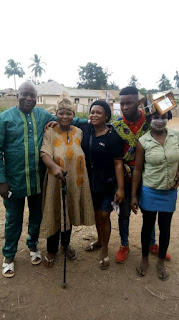The dance steps are beautiful, the lyrics wonderful and the songs captivating, that is Ugogo manhood festival; a traditional heritage of Ihievbe people in Owan East Local Government Area of Edo State bequeathed to them by their fore fathers several years ago.
For first timers, it is simply an enjoyable and memorable festival which brings its sons and daughters from both far and near together
However to the indigenes who are directly involved, they see more to it than lyrics, dance and other activities which were mere prelude to the festival.
The cultural significance of Ugorgor is not only an age group festival but also brings good luck to its indigenes, that is why the festival is celebrated every three years in three days duration by male and by extension female folks of age bracket of 20 to 23 years old as a prerequisite for attaining manhood and womanhood status so as to be able to join in taking vital decisions as it affects the village.
How then is the Ugorgor festival performed?
The fiesta starts with Otua the senior among the sub-clans that make up the village in December,
January of the other year is the turn of other inner clans such as Ugba, Ekhueye, Okuame, Owuei.
The urban settlement Emabu and Iyaba will then celebrate theirs in the month of February, before Ihievbe - Ogben will do theirs in the month of March.
Thereafter as the case may be.
One month to the commencement of the festival in November, the entire village will experience sporadic shooting of dane gun and early morning chanting of songs on daily basis round the village by Women, Youths and Children.
This will then be followed by the gathering of the celebrants (Ozugorgor) under sheds built with bamboo and palm fronds (Egwua} where they nominate the most senior among them in their quarters as their head.
During this period, they are well fed, not allowed to indulge in hard labour and are saddled with the responsibilities of settling some communal disputes as well as apportioning punishment to any offender within their age grade and below irrespective of the sex.
Thereafter, at the expiration of the one Month, the festival is then declared open by the Ukor of Ihievbe the traditional ruler with his council of elders.
During the first day of the festival, celebrants assemble at their family houses putting on a pair of shorts or trousers and canvas sit in chairs with their faces, stomachs and hands tattooed with a dark thick liquid substance known as Asu with white powder sprayed on them by groups of women who at the same time chant sonorous songs to spice up the happy moment.
On completion of these aesthetics, the celebrants are expected to run round the various quarters to shake hands amidst jubilation with their fellow celebrants with the sole aim of knowing the strong from the weaklings.
Basking in the euphoria of the fiesta, between morning and afternoon, the celebrants are meant to run and in sometimes carried on shoulders by strong men within their families round their neighborhood and quarters in company of friends, relatives and prospective wives fanning them.
They are then given a native cutlass called Akpokpozi with a weaved hard native round mat (Asa) held by well-wishers for them to cut in order to show the inner-man in them before going out to do same in the domain of their colleagues.
During this exercise, encomiums are showered on any of them who is able to cut the Asa while those that could not do that are booed and their Akpokpozi seized because they are considered to be lazy men and therefore made to pay a fine before the Akpokpozi seized could be released to such celebrants.
In the evening of that same day, four decorated sets of mirror are tied on their fore heads with a native jingling bell (Agogo) tied with cloth round their waists by groups of elderly men within their families, they are then expected to run around their vicinity before they will then proceed in the middle of the night in large numbers with their Akpopozi to Emabu quarter where the overall senior of all the celebrants resides with the intention to cut a unique brand of Asa called Aimakhour.
During their visit to Emabu among other issues they intimate their host on the need to deliberate and plan towards next festival as well as look into possible areas they can contribute (being confirmed to have attained almost all rituals of becoming a man) to the development of their village. Towards the end of the deliberations, one of the celebrants is expected to sneak out to cut Aimakhour which is jealously kept by the overall senior.
On discovery that Aimakhour was cut, the host quarter will put up a hot chase on their visiting celebrants and their people in an attempt to flog them as a way to learn to be contented with what they have. During this action, those caught are beaten and are assumed not to be real men while those that are able to escape are considered to be real men thereby referred to as true sons of not only their fathers but true sons of the soil.
On arrival that same night from Emabu, they proceed with their family members and friends to the house of the oldest man in the quarter where they are expected to meet with the elders to express what each and every one of them has done or will contribute to the development of himself, his family and the entire village amidst cheers and fun (Adegbor).
Between the hours of 9am – 10.am on the last day of the festival, each family in the village who might have lost their father, mother or dear ones in emotion and fun, run around the community displaying their pictures and dress in a manner reflecting the desired occupation such departed loved ones did while on earth.
Dressed in their beautiful traditional attires in the afternoon of the same day, the celebrants in company of family members, friends and well-wishers between the hours of 1.pm - 5.pm converge at the market square to listen and dance to the admiration of all and sundry to the traditional melodious music supplied by popular musicians.
Returning from the market square, each celebrant is free to invite musician or entertainer of his choice to entertain his families and invited guests till dawn.
This is followed with giving of money to elderly women and all female that are of the same age with them as tradition and customs do not allow the females to actively participate with their male counterparts.
It is during this period that all females who are of the same age with the male celebrants are known to everybody hence are permitted to hold meetings together for the prosperity of the entire village.
The significance of Ugorgor festival among others is to;
Preserve and present the rich culture of ihievbe to the entire world that are beiing showcased during the festival;
To increase the number of small medium enterprises among the people as a result of high patronage of food and cultural items, to serve as source of income and revenue generation to government from taxation due to influx of tourists during the festival that will probably lodge in hotel within the community and it's environs;
To encourage Youths to have interest in wooing investors that would have interest in decision making and contribute to the development of the land of pride so as to promote unity among its sons and daughters residing at home and in the Diaspora.
THE HISTORY AND ORIGIN OF IHIEVBE
Ihievbe community also referred to as Sebe is under the jurisdiction of Owan East Local Government Area of Edo State, Nigeria, West Africa.
It is situated between Afuze-Emai which is the headquarters of the Local Government and Ivbiaro village on the way to Auchi town in Edo North.
It has a population of approximately 50,000 people, these people are often refere to as Ihievbe – Eboh.
It comprises of eight sub-clans namely Otua, Ugba, Ekhueye, Okuame, Oghuore, Emabu, Ihieveho–Ogben and Iyaba.
The land of prosperity (Ihievbe) was founded about 1473 AD by a man called Oboh (i.e. a native doctor) who was one of the sons of Adaobi the founder of Ivbiadaobi clan (children of Adaobi) from the royal family in Benin kingdom. History had it that Oboh ran away with his family and his elder brother as a result of hardship meted out by a reigning Oba in Benin kingdom who was not able to bear any child and then ordered that no man should have sexual intercourse with his wife & if it did happened and resulted to pregnancy, and bring forth a male child such a child must be killed to the extent that no man should shave their hair to mourn.
In view of the polygamous nature of Adaobi and for easy identification of his children, he decided to name any land either of his son settled after one of his wives and son hence Ihievbe - Eboh was derived from ‘Vbe’ who was one of his wives and Oboh one of his son.
The traditional Crown title is called Ukor i.e Ukor of Ihievbe and the throne is rotational among the four noble quarters, Uwadia, Ifa, Airuwujuan and Ore who are the children of Ukhai the illustrious daughter of Oboh.
The chieftaincy title is Aruaye and their language is Owan.
However, the people are Christians, Muslims and traditional worshipers who are the custodians and devotees of the land.
Its economy is primarily based on
agriculture and trading, they are well known in the production of cassava and groundnut as their prominent crop.
As a cynosure of all eyes, the rich cultural heritage of Ihievbe and its beautiful people can only be learnt from their manhood festival (Ugorgor), delicious food, unique mode of dressing, nice cultural dance steps and the spirit of hospitality which speak volume in the land of prosperity.
Idonije Dickson Ikhidero is the assistant Chief Cultural Officer, National Institute for Cultural Orientation (NICO)




